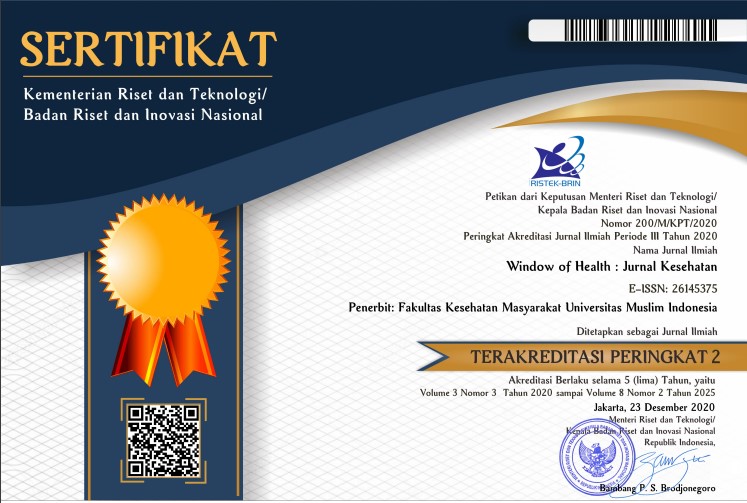Focus And Scope
The Journal of Window of Health: Jurnal Kesehatan is a national with the English English-language, peer-reviewed journal dedicated to publishing original papers. The journal aims to serve as a comprehensive platform for the dissemination of high-quality research, evidence-based practice, and innovative solutions in the fields of health, medical, nursing, midwifery, pharmacy, and medical science. Its scope spans multiple disciplines, providing a forum for scholars, clinicians, policy makers, and health technology developers to share insights that advance public health, healthcare delivery, patient outcomes, and system efficiency.
The journal's scope includes, but is not limited to, the following areas:
Scope of Public Health Science:
Epidemiology:
The systematic study of disease distribution and determinants within populations. It involves analyzing health patterns and trends to provide evidence for the development of effective public health strategies and policies.
Health Promotion and Behavioral Science:
Focused on advancing health literacy and facilitating behavioral modifications to prevent disease. It also includes evaluating the outcomes and effectiveness of health promotion and education programs.
Environmental Health:
The assessment of environmental determinants that influence population health. This field emphasizes identifying risks and formulating strategies to mitigate adverse environmental impacts on human well-being.
Occupational Health and Safety:
The examination of workplace-related hazards and their implications for workers’ physical and mental health. It encompasses the design and implementation of measures to promote safety and enhance quality of life in occupational settings.
Health Administration, Health Law and Policy:
The critical analysis of health systems, health regulations, medical liability, privacy and data protection, governance, and policy frameworks. It seeks to evaluate the efficiency, effectiveness, and equity of health management and policy interventions.
Hospital and Healthcare Management:
Studies on hospital administration, quality improvement, resource management, patient flow, risk management, and strategic planning are within scope. The journal encourages articles that highlight innovative approaches to optimize operational efficiency, organizational performance, and patient satisfaction.
Cost-Effectiveness Analysis in Public Health Interventions:
A methodological approach to assess the economic efficiency of public health interventions. It aims to determine the relative value of preventive measures and healthcare programs in improving population health outcomes.
Nutrition and dietetics:
Covering areas such as clinical nutrition, public health nutrition, food science, nutritional biochemistry, community nutrition, and diet-based interventions.
Reproductive Health:
Addresses reproductive health challenges across diverse populations. It includes an inquiry into family planning, maternal and child health, and the protection of reproductive rights.
Scope of Pharmacy Science:
Investigates the role of pharmaceutical sciences in public health. It involves assessing the efficacy, safety, and broader societal impact of pharmacological interventions.
Scope of Nursing and Midwifery Science:
The journal welcomes studies on nursing and midwifery practices, including clinical care innovations, patient-centered interventions, health psychology, professional education, workforce management, and evidence-based practice that enhances patient safety and quality of care.
Scope of Medicine and Clinical Sciences:
Original research, case studies, and reviews addressing clinical medicine, medical procedures, disease management, preventive care, and interdisciplinary collaboration are considered. Studies may focus on both primary and tertiary care, with an emphasis on improving patient outcomes and healthcare quality.
Scope of Health Technology and Health Information Systems:
The journal emphasizes the role of technology in healthcare, including Medical Records and Documentation, digital health solutions, telemedicine, wearable devices, electronic health records (EHRs), clinical decision support systems, data analytics, and innovations that optimize workflow, reduce medical errors, and enhance patient monitoring.
The research method used in the science of medicine, pharmacy, nursing, and midwifery is an analytical experimental approach. In contrast, the scope of public health science, such as epidemiology, health promotion, environmental health, occupational health and safety, health administration, health Law and Policy, hospital and healthcare management, cost-Effectiveness analysis in public health interventions, health psychology, nutrition and dietetics, health technology and health information systems, health analysis, medical records, health law, and hospital management, is observational and experimental analytics. Currently, we do not accept research methods with descriptive analytics.







